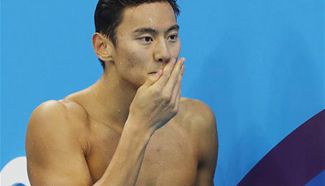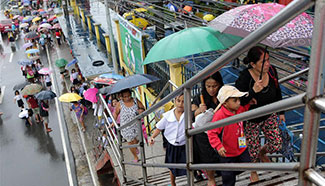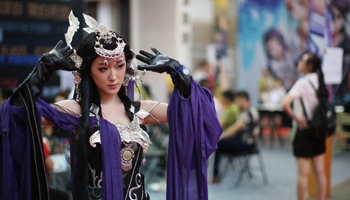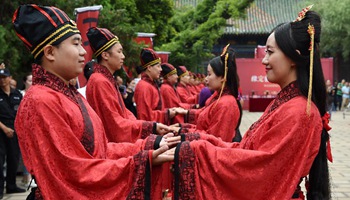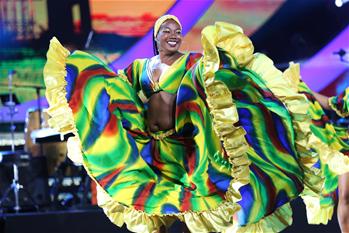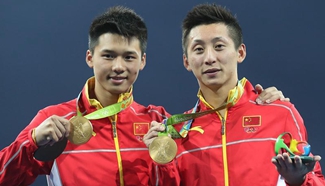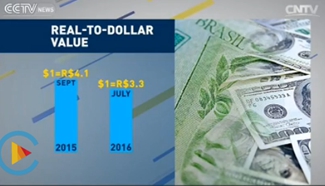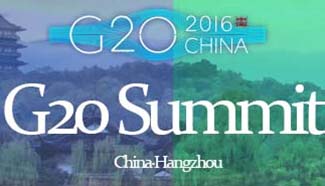UNITED NATIONS, Aug. 9 (Xinhua) -- Senior UN officials on Tuesday underlined indigenous peoples' right to education, calling on governments to improve access to education and ensure that the most vulnerable are not left behind as the journey to achieve the new UN Sustainable Development Goals (SDGs) gets under way.
"In some countries, less than 40 percent of indigenous children attend school full-time," UN Secretary-General Ban Ki-moon said in his message to mark the International Day of the World's Indigenous Peoples. "In many others, few indigenous children complete a full high school education."
"This is unacceptable," the secretary-general said, underscoring that "we will not achieve the Sustainable Development Goals if we fail to address the educational needs of indigenous peoples."
The International Day of the World's Indigenous Peoples is observed on Aug. 9 each year to promote and protect the rights of the world's indigenous population. This event also recognizes the achievements and contributions that indigenous people make to improve world issues such as environmental protection.
This year's International Day of the World's Indigenous Peoples is devoted to the indigenous peoples' right to eduction. In spite of these instruments, the right to education has not been fully realized for most indigenous peoples, and a critical education gap exists between indigenous peoples and the general population.
Indigenous peoples regularly face stigmatization of their cultural identity and lack of respect and recognition for their heritage and values, including in textbooks and other educational materials.
Moreover, their marginalization is often compounded by language barriers as instruction is mainly in the national language, with little or no instruction in, or recognition of, indigenous languages, Ban said.
"I call on Governments everywhere to draw on the guidance of this international framework (the UN Declaration on the Rights of Indigenous Peoples) to improve access to education for indigenous peoples and to reflect their experiences and culture in places of learning," said the secretary-general.
Meanwhile, Ban also stressed the commitment to "ensuring indigenous peoples are not left behind as we pursue the vision of the Sustainable Development Goals."
The SDGs was approved by world leaders in September last year to serve as the blueprint for the global development efforts for the next 15 years.
Goal 4 of the 2030 Agenda for Sustainable Development calls for ensuring equal access to all levels of education and vocational training for the vulnerable, including persons with disabilities, indigenous peoples and children in vulnerable situations.
Hailing indigenous peoples' crucial role as custodians to rich cultural diversity, carrying unique wisdom of sustainable living and respect for biodiversity, Irina Bokova, the director-general of the UN Educational, Scientific and Cultural Organization (UNESCO), reaffirmed the organization's determination to safeguard and promote their identities, languages and knowledge systems.
However, "nurturing and harnessing this potential calls for inclusive and equitable quality education for all," Bokova said, adding that "too many indigenous peoples are still denied the full right to quality education."
The right to education is fundamental, she said, also added that Indigenous knowledge systems hold many answers to mitigating the consequences of climate change.
"UNESCO will continue to draw on these to bolster scientific cooperation for biodiversity as well as education for sustainable development," she said.
This year's theme for the International Day -- Indigenous Peoples and the Right to Education -- reflects a core and underlying principle of the World Intellectual Property Organization (WIPO), said the director general of WIPO, Francis Gurry.
"WIPO's program of work in support of Indigenous Peoples focuses on appropriate tools, both existing or to be developed, to prevent the misuse of traditional knowledge and traditional cultural expressions by third parties," said Gurry.
Also in his remarks on the International Day, Braulio Ferreira de Souza Dias, the executive secretary of the Convention on Biological Diversity (CBD), touched upon the challenges indigenous peoples continue to face, especially their right to access a culturally appropriate education inclusive of their histories, world views and traditional knowledge.
"The CBD works on several themes relevant to indigenous education, most significantly traditional knowledge, innovations and practices, and customary sustainable use of biological diversity," said Dias.
He added that the CBD Secretariat also works closely with indigenous peoples' regional and local organizations to deliver culturally appropriate training through a "train-the-trainer" methodology on participation in the implementation of the Convention.
Applauding for this year's timely theme, Phumzile Mlambo-Ngcuka, the executive director of the UN Entity for Gender Equality and the Empowerment of Women (UN Women), said the theme also aligns with the 2030 Agenda for Sustainable Development's commitment to educational attainment among indigenous women and girls.
"Formal, non-formal and informal education are potent means to enhance the ability of indigenous women to reach their full potential," said Mlambo-Ngcuka, adding that "formal education must also be promoted to ensure that indigenous girls and women are able to effectively participate in all domains of social, economic and political activity."
However, she stressed that high levels of illiteracy among indigenous women regrettably attest to the historical patterns of discrimination and exclusion.

